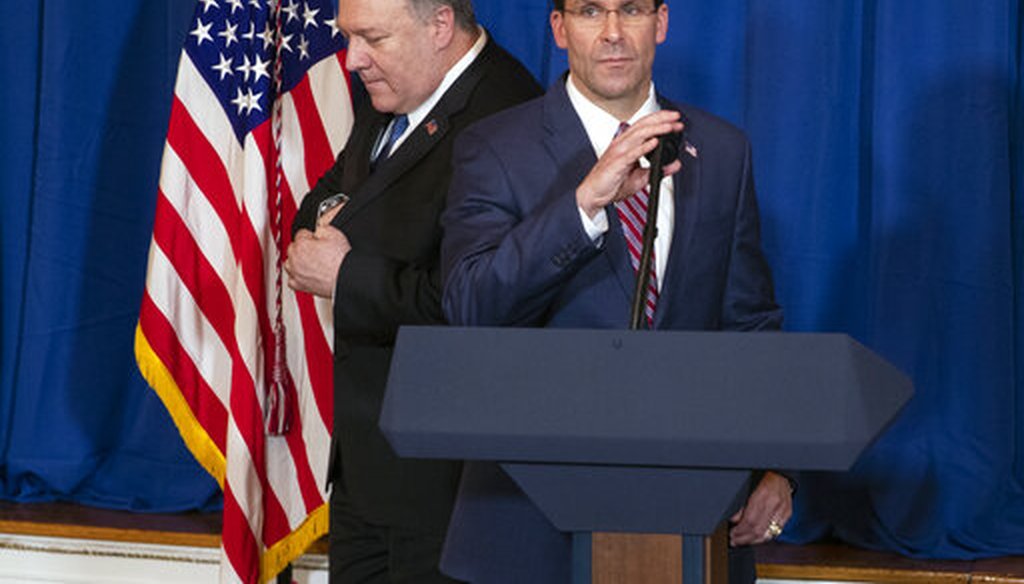Get PolitiFact in your inbox.

Secretary of State Mike Pompeo, left, hands off the microphone to Secretary of Defense Mark Esper to deliver a statement on Dec. 29, 2019, in Palm Beach, Fla. (AP/Vucci)
President Donald Trump and his team of national security officials have offered shifting explanations for the airstrike that killed top Iranian military leader Gen. Qassem Soleimani.
Like most Americans left wondering who to believe, we don’t have access to the intelligence that drove the decision to take Soleimani out. But we reviewed public statements and found that Trump’s team has been inconsistent in describing what the intelligence agencies knew.
Over and over, Trump and his advisers have contradicted themselves and each other on the "imminent threat" posed by Soleimani and the need for preemptive action against him.
The disconnect was on display most recently during the Sunday shows, when Defense Secretary Mark Esper said he "didn’t see" any specific evidence showing Soleimani was planning attacks against four U.S. embassies, despite what the president told a Fox News anchor just two days prior.
Trump, however, says they’ve been on the same page all along.
The Fake News Media and their Democrat Partners are working hard to determine whether or not the future attack by terrorist Soleimani was “imminent” or not, & was my team in agreement. The answer to both is a strong YES., but it doesn’t really matter because of his horrible past!
— Donald J. Trump (@realDonaldTrump) January 13, 2020
"The Fake News Media and their Democrat Partners are working hard to determine whether or not the future attack by terrorist Soleimani was ‘imminent’ or not, & was my team in agreement," he tweeted Jan. 13. "The answer to both is a strong YES."
Here, we’ll review the contradictions.
Trump has described the threat a few different ways: as an attack on a single embassy, as an attack on an unspecified number of embassies, and most recently as an attack on four embassies, including the one in Iraq.
In a Jan. 10 interview with Fox News talk show host Laura Ingraham, he said four embassies, including the embassy in Baghdad, were at risk of getting hit with attacks orchestrated by Soleimani.
"I can reveal that I believe it probably would’ve been four embassies," Trump said.
Trump said the day before that Soleimani was "looking to blow up our embassy."
That same day, while speaking to a local TV station ahead of a campaign rally in Ohio, Trump suggested that additional embassies were also at risk. "In our opinion, our very intelligent opinion, he was going after our embassies, and things could have happened," he said.
Then, during the rally, Trump added, "Soleimani was actively planning new attacks, and he was looking very seriously at our embassies and not just the embassy in Baghdad."
Trump’s mention of "four embassies" seemed to contradict a statement from Secretary of State Mike Pompeo, who said during a Jan. 9 interview that the intelligence agencies did not know "precisely when" or "precisely where" any attacks would take place.
(Pompeo later told reporters that these comments were "consistent" with the idea that "specific information" showed multiple U.S. embassies under threat of attack.)
POMPEO: We had specific information on an imminent threat and those threats included attacks on U.S. embassies. Period. Full stop.
— JM Rieger (@RiegerReport) January 10, 2020
REPORTER: So you were mistaken when you said you didn’t know precisely when and…where?
POMPEO: No. …Those are completely consistent thoughts. pic.twitter.com/GKHHZR4HrT
The president’s statements came into question again when Esper and National Security Adviser Robert O’Brien toured the Sunday shows Jan. 12.
In an interview on CBS’s "Face the Nation," Esper said he "didn’t see" any specific intelligence pointing to threats facing four U.S. embassies overseas, but he said he shared Trump’s views.
.@EsperDoD says he “didn't see” specific evidence showing Iran planned to strike 4 embassies as Trump has claimed. https://t.co/q23RZg3jAm pic.twitter.com/coUekNqyD6
— Face The Nation (@FaceTheNation) January 12, 2020
"What the president said was he believed that it probably and could have been attacks against additional embassies," he said. "He didn’t cite a specific piece of evidence."
When CBS’s Margaret Brennan pressed Esper on whether any such evidence existed, he said: "I didn’t see one with regard to four embassies. What I’m saying is, I share the president’s view that probably — my expectation was they were going to go after our embassies."
The defense secretary also deflected on CNN’s "State of the Union." "What the president said was, he believed it probably could have been," Esper said. "He didn’t cite intelligence."
O’Brien offered more support for Trump’s claim that intelligence showed Iran had drawn up attacks against four U.S. embassies. But he refused to give specific details.
"Everything the president has said is consistent with and his interpretation is very consistent with the intelligence which showed that Soleimani was plotting to kill Americans, soldiers, sailors, airmen and Marines and our diplomats," O’Brien said on ABC’s "This Week."
He said the United States was taking precautions to protect embassies near Iran.
"It’s always difficult, even with the exquisite intelligence that we have, to know exactly what the targets are," O’Brien added on "Fox News Sunday." "But it’s certainly consistent with the intelligence to assume that they would’ve hit embassies in at least four countries."
"We knew there were threats to American facilities," he continued. "Now, whether they were bases, embassies, it’s always hard until the attack happens."
Top administration officials also diverged in their accounts of the Jan. 8 intelligence briefing provided to Congress after the strike was carried out.
Several lawmakers, including members of both parties, said Esper and Pompeo didn’t mention threats facing four embassies during the classified briefing.
"If there was evidence of imminent attacks on four embassies, the Administration would have said so at our Wednesday briefing," said Sen. Chris Murphy, D-Conn., in a tweet. "They didn't."
"I don't recall being told, look, there were four embassies," said Sen. Mike Lee, R-Utah, on CNN. "I'm sure there was a mention of at least one embassy in that briefing."
“I believe that the briefers and the President believe that they had a basis for concluding that there was an imminent attack... It’s just frustrating to be told that and not get the details behind it.” - GOP @SenMikeLee about intel on the strike against Soleimani. #CNNSOTU pic.twitter.com/Tjn82vLSGa
— State of the Union (@CNNSotu) January 12, 2020
Pompeo disputed this, saying in a Jan. 10 White House press briefing that he and Esper did tell Congress about the specific threats to U.S. embassies.
"We told them about the imminent threat," he said. "All of the intelligence that we briefed, that you've heard today I assure you in an unclassified setting, we provide in the classified setting, as well."
Meanwhile, Esper told Brennan and CNN’s Jake Tapper that only the Gang of Eight — a bipartisan group of congressional intelligence leaders — was privy to all the intelligence on Soleimani, including the details of a planned attack in Baghdad.
Some specifics were not shared with the "broader membership of Congress," he said.
For what it’s worth, House Intelligence Committee Chairman Adam Schiff, a Democratic member of the Gang of Eight, told Brennan he believed Esper’s claim was "plain wrong."
"There was no discussion in the Gang of Eight briefings that these are the four embassies that are being targeted," he said.
The White House did not respond to requests for comment.
Our Sources
Donald J. Trump on Twitter, Jan. 13, 2020
The Washington Post, "Trump’s ‘four embassies’ claim utterly falls apart," Jan. 13, 2020
The New York Times, "Esper Says He Saw No Evidence Iran Targeted 4 Embassies, as Story Shifts Again," Jan. 12, 2020
NBC News, "Meet the Press," Jan. 12, 2020
CNN, "State of the Union," Jan. 12, 2020
CBS News, "Full transcript of ‘Face the Nation’ on January 12, 2020," Jan. 12, 2020
CNN, "Trump administration officials have contradicted each other on Soleimani again and again. This is the result." Jan. 11, 2020
Fox News, "NSA O'Brien: Sanctions, protests have Iran 'choked off,' will force them to negotiate," Jan. 11, 2020
ABC News, "'This Week' Transcript 1-12-20: House Speaker Nancy Pelosi, National Security Adviser Robert O'Brien," Jan. 11, 2020
Fox News, "Trump tells Fox News' Laura Ingraham 'four embassies' were targeted in imminent threat from Iran," Jan. 11, 2020
The Hill, "Dem senators say Iran threat to embassies not mentioned in intelligence briefing," Jan. 10, 2020
The Washington Post, "Questions pile up about Trump’s claim that Soleimani was going to ‘blow up’ a U.S. embassy," Jan. 10, 2020
The White House on YouTube, "Press Briefing with Secretary of State Mike Pompeo and Secretary of the Treasury Steve Mnuchin," Jan. 10, 2020
Fox News, "Pompeo responds to John Kerry on Iran: 'It's a fantasy to think that the nuclear deal was good for the United States,'" Jan. 10, 2020
Chris Murphy on Twitter, Jan. 10, 2020
Politico, "Trump claims Soleimani was planning to blow up U.S. embassy," Jan. 9, 2020
Factba.se, "Speech: Donald Trump Holds a Political Rally in Toledo, Ohio," Jan. 9, 2020
WTVG, "EXCLUSIVE: Trump talks about Iran, trade and the importance of Toledo," Jan. 9, 2020
























